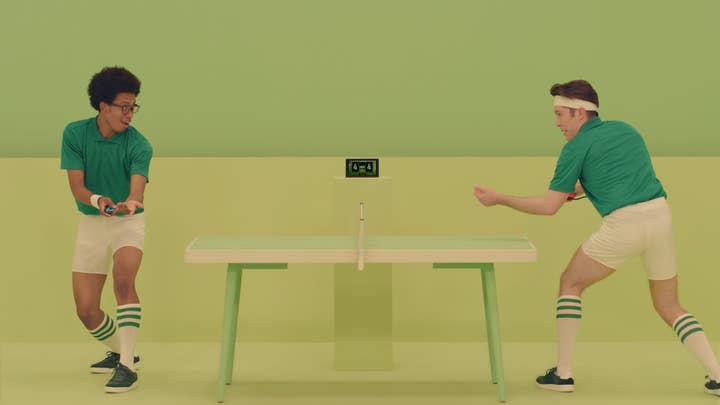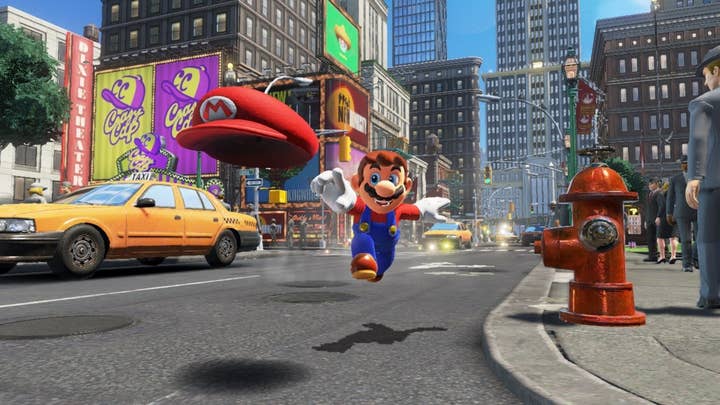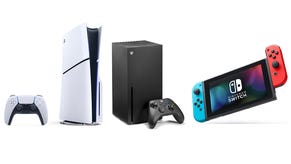Roundtable: The Switch Pitch
What did we make of Nintendo's big reveal?
A few short hours after Nintendo's big presentation was beamed around the world from Tokyo and you're already waist deep in hot takes and opinion pieces on why the Switch will be the best/worst/most average piece of gaming hardware to ever hit the market. Many were underwhelmed by a limited launch catalogue, high price points and low resolutions, but there's also been reams of praise for the innovative form factor and new ideas like HD Rumble. One thing you won't be short of today is opinions, but we couldn't resist throwing a few of our own out there, too.
We'll know more in a few hours, once James Batchelor and Christopher Dring report back from today's hands-on event in London, but for now you'll have to make do with our thoughts on the information from the reveal event itself, looking at that line-up, the battery life, the cost of peripherals. Whilst I think it's fair to say that nobody on the editorial team was blown away by what we saw last night, we're not about to dismiss a company which has made a habit of innovation, either. Read on for our first impressions.
James Batchelor
I found the Nintendo Switch reveal to be remarkably timid for something essentially introduced as the Ultimate Nintendo Console. The intro presentation referring to the features and philosophies carried over from previous consoles made this feel like something the platform holder has been building towards for many years, especially since it faced the challenge of following up the Wii. And yet with less than two months to go until a worldwide launch, it's still hard to identify a compelling reason for consumers to rush out and buy this.
"Cool hardware ideas can only get you so far. It's software that ensures a console's long-term success, and so far we've seen very little of it"
Yes, the hardware is impressive. In addition to the USP of being a home console on the go, something that genuinely appeals to myself and anyone who finds they spend more time travelling than gaming, it also features touch-screen, NFC, gyroscopes, motion and proximity-sensing infrared detection - there are so many possibilities for inventive new game designs, and all for a device that you can take with you anywhere. Yet, history has already shown us such innovation is rarely realised; just look at the concepts teased in the likes of Wii Play and NintendoLand, almost none of which have been built upon by either third-party developers or Nintendo itself.
Cool hardware ideas can only get you so far. It's software that ensures a console's long-term success, and so far we've seen very little of it. The launch line-up is worryingly sparse, limited to a Zelda game shipped in from another console and a handful of others where the only recognisable title is last year's Just Dance. Beyond launch, there's an admittedly promising new IP in Arms, an updated Mario Kart 8, a new Splatoon and a long wait for the excellent-looking Super Mario Odyssey. Third party support was meagre, with confirmation of Skyrim, an overblown FIFA announcement, numerous JPRGs (granted, this was a Tokyo reveal), and developers like Suda51 saying they hope to make something cool, at some point, in the future, maybe. The pressure is on for Nintendo to ramp up their games line-up at E3 - or whenever they choose their next big reveal - because so far the range is sorely lacking, and looks to harm what should have been a very exciting console.

Chris Dring
The challenging launches of Wii U and 3DS were widely blamed on poor marketing, a high price and disappointing launch line-up.
The Switch opening release slate features just one exclusive game, a smattering of third party efforts and the price is too prohibitive for a mainstream gaming audience - and I'm not just talking the hardware here, but software and accessory pricing in particular is eye watering.
However, Nintendo's launch sales estimations are modest, and with a decent cadence of popular first party software throughout 2017 - headlined by Zelda, Mario Kart, Splatoon and Mario - then the Christmas sales window could prove positive.
Dan Pearson
Although I wasn't particularly inspired by anything in the Switch reveal, I'm wary of throwing too much cold water on last night's presentation, as I'm no longer able to pretend that I'm remotely related to the target demographic. Even with a marketing campaign notable for it's complete absence of children so far, Nintendo isn't exactly gunning for the mid thirties market either. And that's fine - please don't think I'm having a little moan about being left out of video games (show me a white man in his thirties who has convinced you he's being left out and I'll sell you a bridge over the river Entitlement) but I also can't really tell who the target audience actually is any more.
"There are new generations waiting to be entranced by new worlds which they haven't inherited from mum and dad, worlds to make their own, worlds which my generation don't need to have ownership of or even understand"
We've seen trailers full of healthy, wealthy millennials, but is that really the market Nintendo expects to be playing? Do they seriously expect 20-somethings to bust out a Switch in a public place and start waggling the Joy Cons? Has that ever been a Nintendo audience? Of course, I'm not one any more, so I might be entirely wrong - I'm not going to tell you I can second guess what people who are half my age enjoy doing, but I suspect that there's a decent cross over with what I was up to then, and it's not playing Mario Kart in a park.
So maybe it's still the classic parent/child double prong approach. After all, there's no denying that a significant portion of Nintendo's appeal comes from a weighty sense of nostalgia for my age group - and that it's both a factor in direct sales and the powerful leverage of parents buying for children - but even nostalgia has a shelf life, even when you're hawking the phenomenally mercurial class of top drawer IP which has formed the core catalogue of every platform the company has ever launched. As the company's smartphone excursions have proven, that magic still has power yet, and could well survive another dozen reinventions, but I've yet to be convinced that we're seeing anything new which is going to establish itself in that remarkable hall of fame.
I know, it's an old argument, appropriately enough, but it would have been so wonderful to see a brand new IP of real weight and import launch alongside the Switch: a last minute Apple style reveal which proved that there are still new rabbits in the hat. I'm sure Odyssey will be great, and full of wonderful ideas, but it does feel a bit like that old house is now composed of more new coats of paint than actual structure underneath. There are new generations waiting to be entranced by new worlds which they haven't inherited from mum and dad, worlds to make their own, worlds which my generation don't need to have ownership of or even understand. Really, (said the old man) somebody should think of the children.

Matthew Handrahan
Sometimes the more you know, the less you understand.
That has proved to be the case with learning more about Nintendo's new console, this morning's fulsome reveal only serving to temper the positive feeling that followed its unveiling last year. Back then, the Switch seemed to have a focus that the Wii U lacked; a clarity of concept that located itself snugly between some of the broader trends in the industry today, while retaining the unique flavour that Nintendo always demands of its hardware. I wouldn't have called it a console for the masses, but I didn't think it needed to be. There were gaps in my knowledge, but I was eager to fill them.
Now, though, I'm just confused, befuddled by what seems like half a dozen different controller configurations, and the inclusion of an odd elaboration on motion control that screams of another neat idea that will be misused or misunderstood by everyone but Nintendo. Switch users will have to pay for multiplayer, despite having only the meanest handful of multiplayer games to justify charging anything at all. You can play side-by-side for free, of course, but that would involve a second Joy-Con controller, which, with the charging plate that makes it feel like an actual pad, will be priced at more than $100 at launch.
Those that do sign up for the online service will get free SNES and NES games as a digital sweetener, but they will apparently disappear from your hard-drive at the end of each month. Given that the hard-drive is only 32GB that's probably a good thing, but such a measly amount of internal storage seems pointlessly and perilously small: Will I need an SD card to download a day one patch? Will indie developers have to release their games on carts to avoid putting pressure on available space?
So many questions, and that's not necessarily a bad thing. The problem is that I'm no longer excited about what the answers will be, my anticipation giving way to a familiar sinking feeling. A few certainties remain, specifically new Zelda and Mario games that I'm sure will delight anyone who waits delightedly for new Zelda and Mario games. After a string of very lean years for Nintendo, though, in which its loyal fans weren't enough to save the company from worrying decline, the Switch has to offer a whole lot more.
Brendan Sinclair
Last night's Nintendo Switch event told me almost everything I really needed to know. It wasn't just about the launch date (pleasingly imminent), the price (acceptable, if perhaps a mite bit steep), or the launch lineup (thin even by Nintendo's standards). Mostly what I wanted to see from Nintendo was a commitment to experiment in software the same way it spent the past dozen years or so experimenting with hardware.
We had glimpses of this during the Wii U's brief lifespan, of course. That machine saw Splatoon, arguably the first major new character-driven IP from Nintendo since Pikmin. It also spent much of its life anticipating The Legend of Zelda: Breath of the Wild, with an open-world approach that should shake up what had become (at least in my opinion) a tediously formulaic franchise.
With the Switch reveal, it appears these were not just aberrations for Nintendo, but evidence of a new philosophy that seems a bit more accepting of risk. ARMS is another new IP with some classic Nintendo character design, and Super Mario Odyssey looks to be the franchise's most ambitious title in years. Simply dropping Mario into a more realistic downtown city setting populated by properly proportioned people was enough to raise eyebrows.
Some people loved it. Some didn't. But that's exactly the kind of game Nintendo needs most now. The GameCube and Wii U showed that solid (and sometimes even exemplary) new versions of all its old franchise formulas aren't enough to keep the business growing.
Yes, it looks like Nintendo has once again ignored the lessons it swore it learned about robust software support after the launch of the Wii U, the 3DS, and the Wii. And yes, the initial signs for third-party and indie support for the Switch are just as dire as they were for the Wii U, if not more so. But Nintendo hardware lives and dies by Nintendo's ability to create compelling reasons to own it. And for me, Nintendo's apparent new approach to shaking up its major franchises and a willingness to add to that stable with new IP are the most compelling reasons conceivable.








